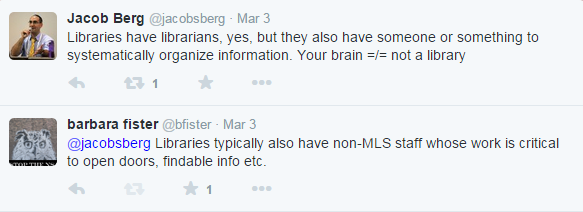You have /5 articles left.
Sign up for a free account or log in.
On Twitter the other day, a question bubbled up that is a perennial in my field. What is the purpose and value of a library degree? (It’s a sibling to the question “why isn’t that taught in library school?” where “this” = whatever thing librarians want new hires to do but don’t want to learn themselves. Oh, how we do like to complain about library school!)
This conversation started with a provocation from a library school professor who likes to make us think.

Indeed, it did make us think about many things. I thought “most of the faculty I work with who value my work would strongly disagree with that statement.” Jacob Berg came back with some skepticism, and I joined.

And another voice chimed in.

And on it went – is the degree valuable? Is it about identity formation? Values? Mere credentialing? A waste of time and money?
This discussion, for me at least, was influenced by a previous kerfuffle, librarians responding to a posting for a public library director with an hourly salary of $7.25. That’s appalling. Oh, for shame! How dare they devalue our labor! But Jason Griffey who grew up near that library pointed out in a thoughtful, informative post, this job is in one of the poorest counties in the country, very close to where Lyndon Johnson launched the War on Poverty that we decided to end by withdrawing. It’s hard to come up with money for librarians when so many residents are unemployed and their future seems bleak. (It's also in a state where the Tea Party is doing its best to sue public libraries out of existence.) Yet this is exactly the kind of community that needs, that deserves a library, even if they can't afford librarians.
So the questions kept coming. Do we even need a degree to be a librarian? What distinguishes a librarian from a person who simply works in a library (often for much less money)? Is the degree just a pricey credential? What about those institution that think hiring desperate history PhDs for less would work out better? This Tweet won the Internet that day for me.
 C
C
I went to school so long ago we were still on AACR I (That’s a librarian frame of reference for “oh my God you are so old!”) Catalogs contained cards. Databases were so rare and expensive to search (you paid by the minute) that the only people who got to search them were librarians, and I got one chance to try it with another student. Our search bombed. We didn’t get a second try. So rather like my liberal arts undergrad degree, the specifics of what I learned have undergone some renovation. But some things stuck. The experience of tackling really daunting reference questions collected by a very demanding and wonderful teacher who made us stretch. Having to research and explain something well beyond my knowledge base in a science reference course (and getting pretty excited about a mathematics theory that I hadn’t heard of until I did the assignment - just knowing I could get excited about something totally outside my comfort zone was a revelation). Finding out what a library really is and why they matter in society. Finding out that, as a profession, it’s our job to fight for intellectual freedom and against censorship. That there are lots of different kinds of libraries, but we have some values in common and they matter.
Even when I was in library school the questions we were just tweeting about were being asked, as they often are in other pre-professional programs like journalism or law schools. Why do I have to study this theoretical stuff? Just tell me what I need to know to do the job, and as quickly as possible. This is a really hard balancing act for Library and Information Science faculty. What do grads need to know for their first job and what will be valuable in five or ten years? What is foundational, what is optional? How can the value of a rather short, very practical degree be expressed to that cluster of students who resent having to earn it and think it’s just an expensive ticket required for jobs that they already feel qualified to do?
I can’t point to many things I was taught that I use in my work today, but there were a lot of things I learned, things I came to believe. The experiences I’d had working in libraries suddenly were connected to a larger discipline that raises questions that matter.
Now when undergraduates ask about library school I try to be realistic – jobs aren’t plentiful, the pay isn’t great, some organizations are pretty toxic. Getting a foot in the door is really hard. You will have relatives who will repeatedly use the phrase "buggy whips" and laugh. But if you do apply to library school, don’t do it because libraries feel like safe places. Get good advising, try things that you feel ill-prepared to do, challenge yourself. Because those challenges will keep coming and you might as well get the hang of it.
Thanks to all of my Twitter friends for making me think. And my mostly long-gone library school faculty who did the same.

